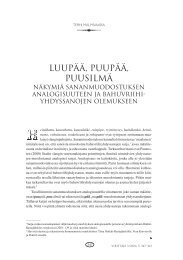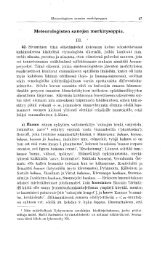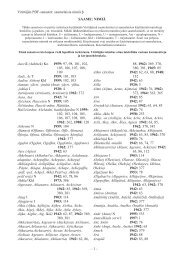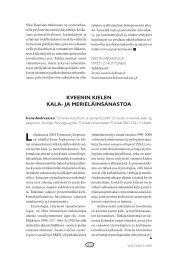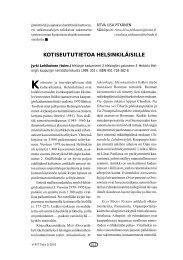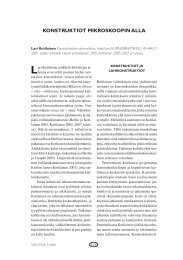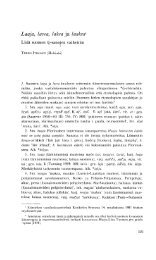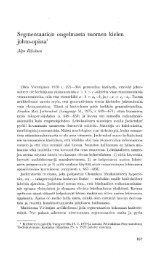pdf-tiedostona - Kotikielen Seura
pdf-tiedostona - Kotikielen Seura
pdf-tiedostona - Kotikielen Seura
Create successful ePaper yourself
Turn your PDF publications into a flip-book with our unique Google optimized e-Paper software.
tence Vdked tulee 'people are coming'<br />
would thus originally have meant approximately<br />
'there is a coming from the<br />
people'. So straightforward a semantic<br />
development does not, however, seem to<br />
be completely natural. Additionally, the<br />
part played perhaps by the partitive<br />
object on the origin and development of<br />
the partitive subject is neglected in this<br />
explanation.<br />
On the basis of Lappish and Mordvin<br />
it is possible to demonstrate that already<br />
in early Proto-Finnic the system of object<br />
cases in affirmative sentences was similar<br />
to that of modern Finnish (cf. Erkki<br />
Itkonen 1972: 210—211). At that time<br />
the cases of the object were the partitive,<br />
based on the old separative case, and<br />
the accusative ending in -m along with<br />
the nominative which alternated with it<br />
under certain conditions. (This is the<br />
origin of the modern Finnish accusative<br />
with its two forms.) As is the case in<br />
modern Finnish a partitive object was<br />
probably used for (certain types of)<br />
irresultative sentences as well as in those<br />
resultative sentences denoting an indefinite<br />
quantity of a divisible object-<br />
A) Niitty kasvoi hyvdn heindn (ace. sg.)<br />
'—' hyvdd heindd (partit. sg.) 'the<br />
meadow gave a good harvest of hay<br />
— good hay'<br />
Pesd kuhisee muurahaisia (partit. pi.)<br />
'the nest teams with ants'<br />
TERHO ITKONEN<br />
concept; the nominative/accusative seems<br />
to have been used in resultative sentences<br />
to express a definite quantity of a<br />
divisible concept or an indivisible whole.<br />
If the case of the subject at this stage<br />
was only the nominative this must have<br />
meant an asymmetry of the means of<br />
expression, and it probably was most<br />
clearly in evidence in those cases when an<br />
intransitive sentence had a corresponding<br />
transitive sentence with the same meaning<br />
and similar form. This seems to have<br />
been the case at least in the three instances<br />
which will be illustrated by<br />
examples in the following. The sentences<br />
in the left series are (resultative) transitive<br />
sentences exhibiting an opposition<br />
between accusative and partitive object.<br />
On the right are intransitive sentences in<br />
which this is neutralized in favour of the<br />
sole case of the subject, i.e. the nominative.<br />
(In the second transitive sentence<br />
of group A the predicate verb is irresultative<br />
and the case of the object is partitive;<br />
in the corresponding intransitive<br />
sentence the case of the subject is the<br />
nominative.)<br />
Niityssd kasvoi hyvd heind (nom. sg.)<br />
'a good hay-harvest grew in the meadow<br />
-^ good hay grew . . .'<br />
Pesdssd kuhisevat muurahaiset (nom. pi.)<br />
'(the) ants are teaming about in the nest'<br />
In this group the local adverbial of the intransitive sentence corresponds to the<br />
subject of the transitive sentence. The predicate verb is identical in the transitive and<br />
intransitive sentences, but the meaning of the transitive predicate becomes passive<br />
in the transitive sentences.<br />
B) (Mind) sain eilen kirjeen (ace. sing.)<br />
~ kirjeet (nom.-acc. pi.) ~ kirjeita<br />
(partit. pi.) T got a letter ~ the<br />
letters — letters yesterday'<br />
Poika unohti evadt (nom.-acc. pi.)<br />
~ euditd (partit. pi.) 'the boy forgot<br />
his lunch ~ some of the provisions<br />
for a meal'<br />
Myrsky kaatoi metsan (ace. sg.) ~ metsad<br />
(partit. sg.) 'the storm felled a forest<br />
~ some forest'<br />
Tauti tappoi lapset (nom.-acc. pi.)<br />
~ lapsia (partit. pi.) 'the disease<br />
killed the children ~ children'<br />
Minulle tuli eilen kirje (nom. sg.) ~ tulivat<br />
eilen kirjeet (nom. pi.) 'a letter arrived<br />
for me yesterday — (the) letters arrived<br />
. . .'<br />
Pojalta unohtuivat evadt (nom. pi.) 'the<br />
boy forgot his lunch ~ some of the<br />
provisions for a meal' (lit. 'from the boy<br />
the lunch was forgotten etc.')<br />
Myrskyssd kaatui metsd (nom. sg.) 'a forest<br />
~ some forest fell in the storm'<br />
Tautiin kuolivat lapse t (nom. pi.) 'the<br />
children ~ children died of the disease'<br />
In this group as well the local adverbial of the intransitive sentence corresponds<br />
to the subject of the transitive sentence. Nevertheless the predicate verb is not the<br />
same in both the intransitive and the transitive sentences. An intransitive predicate<br />
59



